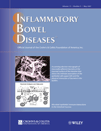Smoking and inflammatory bowel disease: Trends in familial and sporadic cohorts
Abstract
Background: Ulcerative colitis (UC) and Crohn's disease (CD) result from genetic and environmental factors. Never smoking and formerly smoking increase the risk of UC, whereas smoking exacerbates the course of CD. We sought to define the age-dependent effects of smoking on the development of UC and CD in familial and sporadic cohorts.
Methods: University of Chicago patients diagnosed with UC or CD between 1990 and 2002 were surveyed about their tobacco use relative to their diagnosis. Smoking trends were used to estimate age-dependent odds ratios and the attributable risks of smoking in the IBD cohort compared to in the general population.
Results: One thousands and thirteen patients were included in the study: 245 with sporadic UC; 216 with sporadic CD; 249 with familial UC; and 303 with familial CD. Being an ex-smoker conferred an increased risk for UC in the 25–44 age group in both the sporadic and familial cohorts, but not in the 45–64 age group in the familial UC cohort. Furthermore, there was no difference in tobacco use between patients with sporadic CD and the general population, although there was a significant increase in smoking in younger patients with familial CD.
Conclusions: Ex-smokers make up an increasing percentage of older patients diagnosed with UC, accounting for more than 35% of the attributable risk of late onset (>45 years) UC and a large component of the second peak in diagnosis. Current smokers account for a large percentage of patients diagnosed at a younger age with familial CD but not with sporadic CD. Families with IBD should be counseled that early tobacco use significantly increases the risk of developing CD or, if an ex-smoker, UC at a young age.
(Inflamm Bowel Dis 2007)




